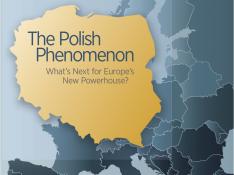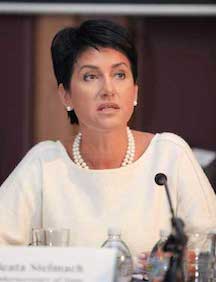The KF Economic Conference
New Report Examines Continuing Strength of Polish Economy, Remains Upbeat About the Future
NEW YORK, November 1, 2013 — A new report on the proceedings of the Kosciuszko Foundation Economic Conference 2013 underscores the continuing strength of the Polish economy, the entrepreneurial spirit of Poland's people and optimism about the country's future. "The Polish Phenomenon: What's Next for Europe's New Powerhouse?" was sponsored by the Kosciuszko Foundation and the Ministry of Foreign Affairs, Republic of Poland.
"Polish workers used to travel abroad to where the factories were," said Alex Storozynski, President and Executive Director of the Kosciuszko Foundation. "These days, factories move to where the Polish workers are." He observed that Dell, Cadbury Schweppes, Twinings, Credit Suisse and Electrolux have all moved jobs to Poland recently.
Marek Belka, President of the National Bank of Poland, served as keynote speaker at the conference, which took place September 27 at the New York City headquarter of the Kosciuszko Foundation. Belka noted that Poland—the only Eurozone nation to have avoided recession in the wake of the global economic crisis of 2008—"experienced rapid economic convergence to the European Union" in the last two decades. He also pointed out that, compared with European powerhouses, Poland's "share in world exports of goods and services has risen fastest."
Belka attributed the resilience of the Polish economy to "balanced economic growth, floating exchange rate, stable current account balance, flexible labor market, well-capitalized banking sector and public investments." He praised Poland's macroeconomic policy for maintaining low inflation as well as moderate, stable growth.
The conference also featured two panel discussions. The first panel, titled "Riding Out the Storm: How the Finance and Banking Sector in Poland Navigated the Recession and the Path Ahead," was moderated by Douglas L. Peterson, then President of Standard & Poor's Ratings Services (now CEO of McGraw Hill Financial). The panelists included Pawel Graniewski, Vice President, Management Board of the Warsaw Stock Exchange; Michal H. Mrozek, Managing Director, Citibank; Dominik Radziwill, Alternative Executive Director, International Monetary Fund; and Pawel Tamborski, Undersecretary of State, Ministry of the Treasury of Poland.
The panel agreed on the overall health of the banking sector, which has been fostered, as Michal Mrozek noted, by a regulatory framework that encouraged "the creation of [foreign] subsidiaries as opposed to branches of international banks, which allowed for strong, robust local regulatory oversight."
The second panel, "The Land of Opportunity—an Investor Perspective," was moderated by Matthew Kaminski, Member of the Editorial Board, The Wall Street Journal. Panelists included Beata Stelmach, Undersecretary of State, Ministry of Foreign Affairs of Poland; Paul Fogo, Esq., Miller Canfield and American Chamber of Commerce in Poland; Roger M. Widmann, Director of the Board, Standard Motor Products; Robert Snell, Managing Director and Global Head of Emerging Markets Multinationals, Citigroup; and Grzegorz Inglot, Advisor to the Supervisory Board, INGLOT Cosmetics.
The panel discussion revolved around the relative ease of doing business in Poland, and the usefulness of the country as a gateway for trade and investment throughout the EU. Beata Stelmach summed up Poland's astonishing evolution: "During one generation we changed from being a poor and gray communist country, somewhere in the far north, to the sixth economy in Europe and the 20th economy in the world."
Both panels, as well as keynote speaker Belka, discussed the rapid, continuing improvement in Poland's infrastructure as well as the next challenge ahead: fostering more R&D and more risk-taking in business, in order to move to the next level as a center of innovation.
The conference and report were co-financed by funds granted by the Ministry of Foreign Affairs of Poland in the competition for the public task "Cooperation with Polish Diaspora and Poles Abroad in 2013."
###
About the Kosciuszko Foundation
Founded in 1925, the Kosciuszko Foundation promotes closer ties between Poland and the United States through educational, scientific and cultural exchanges. It awards up to $1 million annually in fellowships and grants to graduate students, scholars, scientists, professionals, and artists, and promotes Polish culture in America. The Foundation has awarded scholarships and provided a forum to Poles who have changed history.
The project was co-financed from the funds granted by the Ministry of Foreign Affairs of Poland in the competition for the public task "Cooperation with Polish Diaspora and Poles Abroad in 2013."





